About Speaking of Blood Clots
When I survived my second "unprovoked" pulmonary embolism, I began questioning the very notion of "unprovoked" blood clots. This led me to research highlighting the crucial role of lifestyle in both prevention and recovery. Scientific studies suggest that unprovoked VTE could be reduced by 12% if we focused on improving four key areas of health (PMID: 33191841). I realized that my struggles with obesity, a sedentary job, and other lifestyle factors likely contributed to my condition. I also discovered that lifestyle risk assessments and counseling are underutilized but crucial tools for blood clot prevention and creating a recovery and management plan.
This was the spark for Speaking of Blood Clots.
Our Mission
At Speaking of Blood Clots, we believe lifestyle intervention should be the foundation of blood clot prevention and recovery plans.
How We Live Our Mission
- Education & Empowerment: We provide evidence-based education, courses, and speaking engagements to women’s groups and healthcare organizations, illustrating clear steps for implementing positive lifestyle habits that are sustainable and recommended for cardiovascular health. We equip women with the knowledge and tools they need to find their voice and make informed decisions about their health and wellness with confidence and critical thinking.
- Collaboration & Individualized Care: We value the role of healthcare providers and emphasize shared decision-making between women and their doctors. We recognize that every woman is unique and evidence-based research often needs to be tailored to individual needs and circumstances, especially for women with a history of blood clots and clotting disorders who are often excluded from clinical trials. We advocate for a personalized risk vs. benefit approach to healthcare based on individual needs, preferences, and the latest research.
- Bridging the Gap: We recognize that there can sometimes be a gap between science-backed lifestyle factors and their integration into clinical practice. My own experience with a second pulmonary embolism highlighted this challenge, as a comprehensive lifestyle plan wasn't fully incorporated into my care, even though "lifestyle" and "obesity" were noted eight separate times in my hospital notes. Providing resources and education that empower both women and their healthcare providers to collaboratively address lifestyle factors in blood clot prevention and recovery is imperative.
Finding Your Voice & Building Your Healthcare Team
Becoming a true partner in your care involves finding your voice and building a healthcare team that understands your needs and supports your goals.
We guide women on:
- Effective communication: We teach women how to formulate clear questions, communicate confidently, and reframe conversations, ensuring their voices are heard and their needs are met.
- Building a team: We provide resources and strategies for finding healthcare providers who are committed to collaborative care and how to manage multiple specialists.
A Turning Point
During my recovery, I received life-changing advice from my outstanding vascular surgeon: "Doctors don't know everything; anything is possible." These words became a turning point in my journey. They highlighted the importance of collaboration, critical thinking, and asking questions. They empowered me to become an active participant in my healthcare, advocating for myself and seeking answers.
At Speaking of Blood Clots, we believe that every woman deserves to feel empowered in her healthcare journey. We encourage you to ask questions, seek second opinions, and partner with your healthcare providers to make informed decisions about your health.
Patients and providers are ultimately on the same team, working towards the shared goal of reducing women's risk of blood clots.
